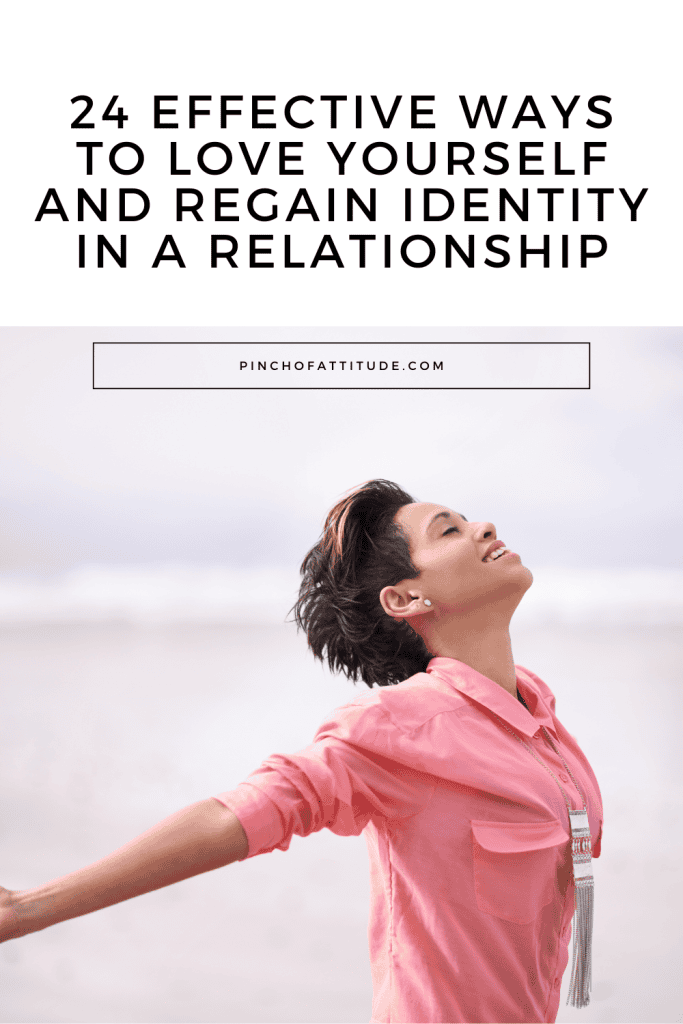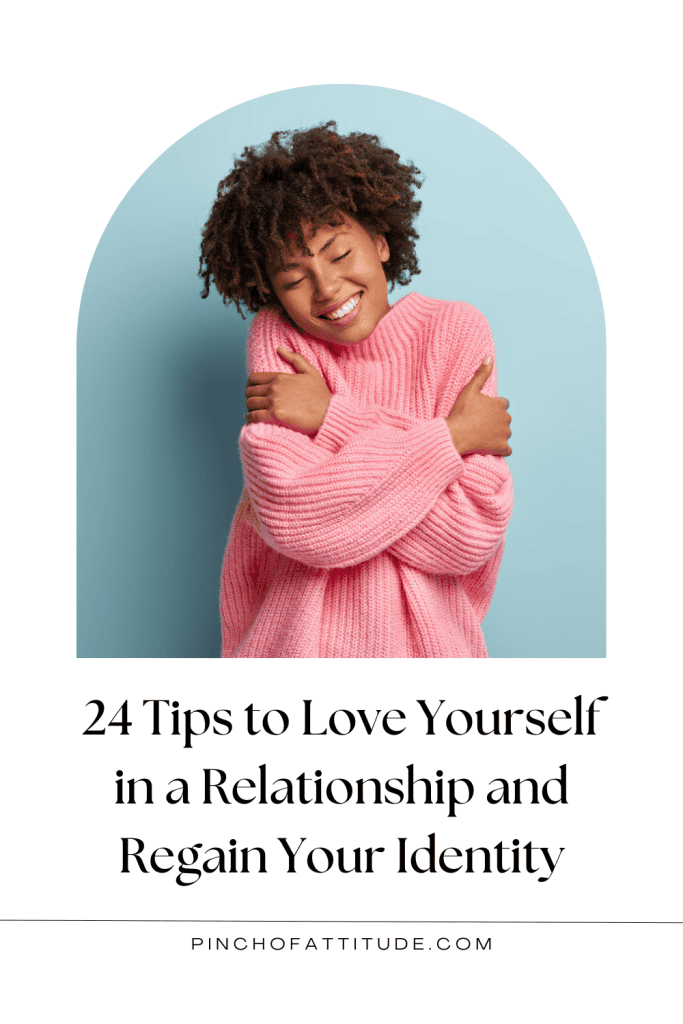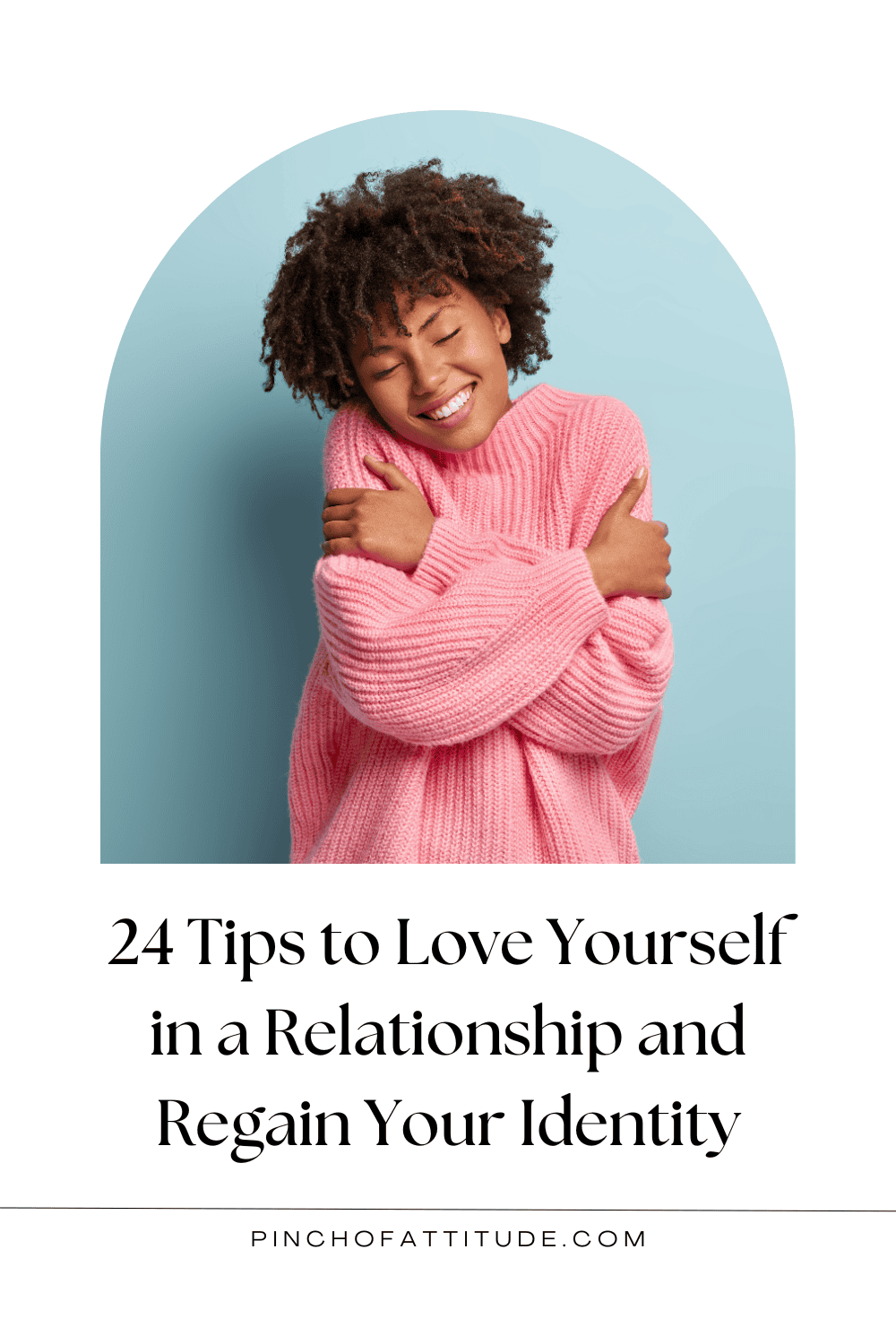Our personal relationships often introduce new activities and interests to our lives. While it’s enriching to explore someone else’s passions, it can also interfere with our ability to pursue our own.
I found out this lesson the hard way when I realized that the people I cared for and give my support to in my family didn’t do the same for me.
While I’d never give up my shared experiences with my partner, I’ve also discovered that loving someone else doesn’t mean that I have to ignore my needs.
If you feel like you’ve lost a part of yourself in a relationship, then I highly recommend taking these steps to regain your personal identity and learn how to love yourself in a relationship.
- Criticism and conflict can be managed by practicing self-care, focusing on your personal joy, setting healthy boundaries, and staying focused on your personal goals.
- Regularly re-evaluating your relationship is important for your mental health. Toxic signs in relationships include constant criticism, manipulation, aggression, and lack of support.
- Proactive steps to cultivate self-love include recognizing your self-worth, forgiving your past mistakes, maintaining your physical health, and cultivating a supportive network outside your relationship.
Table of Contents
How to Love Yourself in a Relationship?

Self-love in relationships is very important and key to any successful relationship. Without it, your relationship may experience unexpected moments that can be easily avoided.
Below are my favorite tips you can use to kick-start your self-love journey.
1. Know That Your Reality Is Not Who You Are
Don’t allow yourself to be confined by the limits of your current situation. I learned that if I wanted a relationship to work, it was best for me to maintain my own identity and hold on to my independence.
As you evaluate your situation, you need to put your environment in perspective. Look within yourself and separate yourself from the confines of your environment.

Remember your strength and set your resolve. Embrace your self-worth and remember to find the path that is right for you.
2. Face Your Trauma and Accept the Challenge
We all face unpleasant events, especially when we’re dealing with toxic behaviors. Some can be quite traumatic and may shake you to your core. Don’t let those experiences dictate who you are.
How do you create self-love in a toxic relationship? By facing the trauma. Accept the challenge and identify the lessons the situation has to offer and apply those lessons to your daily life.
Use what you have learned to become stronger mentally and look for new opportunities for growth. Face each challenge and look for the lessons that are offered.
When I was trying to find my way out of an abusive relationship, I had to learn how to process the experiences so they didn’t have a negative impact. I am a survivor, not a victim.

3. Work on Improving Your Self-Worth

I went through a period of time in my life when I experienced a series of setbacks that made me question everything about myself.
I no longer knew if I had the skills I needed to progress in my career, and I let my insecurities seep into my relationship.
Once I realized that I was sinking into a pit of despair, I made the conscious decision to take control of my thoughts.
I started by making a list of my accomplishments and strengths, which helped to renew my ability to see my value.
When you do this, I recommend including all of the positive traits you can think of, even if they don’t necessarily apply to the specific situation.
The point is to see yourself as a person who has value, whether you are at work, volunteering at your kid’s school, or on a date with your significant other.
While it didn’t happen overnight, reading this list and adding to it gradually gave me more confidence which made me believe in myself more.
4. Forgive Yourself for Your Past Mistakes
I used to carry the burden of past mistakes, it was like a heavy backpack, dragging me down. I started a self-compassion journal where I wrote down each mistake and the lesson it taught me. Over time, I was able to forgive myself, and that heavy backpack became lighter, liberating me to move forward.
5. Learn How to Say No Whenever You Need To
I’ve learned to set boundaries after realizing my time and energy were finite.
I used to feel guilty about saying no until I burned out from over-committing. Now, I understand the importance of respecting my limits.
So, when asked to do something that compromises my well-being, I confidently say no.
The first time you do this might feel hard, but I promise it gets easier with time.
6. Make a Plan to Stay Fit and Healthy
In my 20s, it was easy to find time to spend hours at the gym getting fit, and I didn’t have to worry so much about my diet back then when I only had to cook for myself.
Over the years, I found that adding new relationships to my life impacted my ability to practice self-care.
After all, who has time to go to the gym when they’re running after toddlers all day?
Plus, I found that simply throwing a salad on the table wasn’t so easy when I had zero time to chop vegetables and my family wanted for sustenance than a bowl full of lettuce.
After realizing that I’d let my physical health go since starting a family, I decided to make some changes.
Fusing my responsibilities to my loved ones with the goals I had for myself wasn’t as hard as I expected.
I decided to make after-dinner walks a regular part of our family routine.
I also created a menu for each week that included healthy meals that everyone would eat.
Did I also decide to outsource some of the prep work?
You bet I did! I opted to pick up a few pre-chopped veggies to add to our plate.
Even a pre-made salad kit is fine for adding a health boost to pizza night.
7. Get Rid of Anything in Your Life That Affects Your Peace of Mind
I once let negative influences and stressors take a toll on my peace of mind. But I took stock of my life and made changes, distancing myself from negativity and decluttering my space.
Gradually, I regained my tranquility and felt more balanced and at peace.
8. Be Present
Being constantly distracted and multitasking was a norm for me until I realized how much of life I was missing. I began practicing mindfulness, appreciating each moment as it came.
This helped me stay grounded, and I found more joy and fulfillment in everyday moments.
9. Write Down All Your Negative Thoughts
I found myself caught in a whirlwind of negative thoughts. One day, I started writing them down, a kind of thought dump. As I externalized them, I saw patterns and distortions, which helped me understand and challenge these thoughts, bringing more clarity and peace to my mind.
10. Stop Being Too Hard on Yourself
I was my own harshest critic, always setting high standards for myself. One day, I realized this was causing more harm than good.
I started acknowledging my efforts, embracing my imperfections, and practicing self-compassion. This change in attitude helped me feel more content and less stressed.
11. Give Yourself a Gift That You’ve Always Desired
I’ve always loved music, and dancing isn’t my only passion.
I always dreamed of being able to play a few songs that also brought other people joy.
When I was a kid, my biggest dream was to own a guitar, but somehow I never got the chance.
After receiving a recent income boost, I decided to give myself the gift of taking lessons.
While I didn’t run out and buy the most expensive guitar, I did finally get one of my own that I now play proudly.
The best part about my decision is that I not only feel my self-worth rising every time I learn a new chord, but I also love being able to play songs for my family on our annual camping trips.
12. Build a Strong Support System Outside Your Relationship
Have you ever known one of those people who ditched all of their friends when they got into a relationship?
Or, maybe you were that person?
If so, there’s no shame in learning a few hard knocks along the way.
I also went through one of those breakups where you break free from the spell that loves casts upon you and realizes that there’s no one else around.
While I rebuilt these friendships, it took time to get back to the bond that we had in the beginning.
I recently realized that I’d made the mistake in a smaller way as my family responsibilities began to pile up.
Making it a priority to call my best friend for a chat or ask my coworker out for a weekly lunch date helped me start rebuilding a support system that extends beyond my immediate family.
13. Work With a Therapist if You Need To
When I faced an extremely challenging phase in life, I decided to see a therapist.
The professional guidance helped me navigate my struggles and equipped me with tools for self-love and emotional resilience.
14. Take Time for Yourself
There’s nothing wrong with spending plenty of time with your significant other. In fact, it’s the main benefit of a relationship, finding someone to share your life with!
But even small moments of personal space can be hugely helpful for developing a self-love practice.
I encourage you to try the below activities and integrate them into your life:
- Enjoying a spa day once a week
- Having a night out with your girlfriends
- Taking time to connect with your family
- Giving 20 minutes a night to enjoy a book before bed
Each act of kindness and care that we offer our special person will make us feel better about ourselves and more confident to take on a healthy and thriving relationship.
15. Take One Step at a Time
In my journey towards self-love, I realized it’s a continuous process. Instead of rushing or criticizing myself, I learned to appreciate each small step forward. I’ve found contentment in the journey itself.
16. Surround Yourself With Like-Minded People
In seeking self-improvement, I began to connect with people who shared my values. Their inspiring stories and shared aspirations fueled my personal growth and further affirmed my commitment to self-love.
17. Always Express Gratitude for What You Have
After a period of dissatisfaction, I started a gratitude journal, documenting the blessings in my life.
This practice shifted my perspective from what I lacked to appreciating what I had, fostering a more content and positive outlook.
18. Be Courageous and Ask For Feedback and Perspective

When I first started my career, I was terrified of asking for feedback.
But, I eventually learned that constructive criticism helped boost my growth and made me more self-aware.
While hearing someone’s perspective is incredibly beneficial, this piece of advice comes with one simple caveat.
I definitely recommend making sure to only ask for feedback from people who will provide it with empathy and a desire to see you achieve your goals.
Getting feedback from positive-minded people who are invested in your progress, such as an admired boss is very different from negative comments from jealous coworkers.
19. Accept Compliments Graciously
I used to deflect compliments, feeling unworthy. But over time, I learned to accept them graciously.
These positive affirmations from others began to reinforce my self-esteem and self-worth.
I’ve even recorded a few in my journal that I can revisit on days when I feel a sense of negativity creeping in.
20. Pursue Your Interests and Dreams
When I decided to follow my passion for photography, not only did I find joy but also a sense of fulfillment and self-worth. Pursuing my dreams affirmed my belief in myself and gave me a sense of purpose that fuels self-love.
21. Encourage Healthy Communication
Communication is a two-way street that fosters healthy relationships with yourself and your partner. You need to feel uninhibited when you talk with your partner.
You should be able to honestly talk about how you’re feeling without worrying about their reaction.
It’s also important that you know how to actively listen to your partner without judging. Compassionate listening can ward off communication breakdown and potentially relationship-damaging arguments.
If you do experience any issues, work together to find more compassionate ways of communicating.
Remember how we mentioned setting boundaries with your “me time”? You also need to set boundaries when it comes to communication.
Think of boundaries as your invisible coat of armor. They’re put in place to protect your emotional well-being. These boundaries are personal, so there is no steadfast rule you need to follow. Think about what you will and will not tolerate in terms of communication and treatment from your partner.
22. Show Yourself Compassion
Showing other people compassion is sometimes easier than giving it to yourself. But you need to be your biggest cheerleader, no matter how wonderful your partner may be. You need to love yourself with the same intention as you love others.
Give yourself the power to make mistakes and know your self-worth is still intact. We’re all human, and we all make mistakes. You just need to have the same empathy and compassion for yourself as you have for others.

23. Make Sure That You Establish Your Boundaries and Standards
All too often, people compromise their needs or allow others to transgress their boundaries hoping that it will avoid a larger conflict.
A better approach is to be clear about what you want (and don’t want) from the relationship very early on with your partner. This doesn’t have to be an ultimatum or a list of impossible requests.
In fact, it works best when you ask your partner what their needs are too, so that both people are being heard and honored in the relationship.
Speaking up for your needs isn’t a one-time deal when it comes to relationships. You’ll need to check in with each other about your boundaries and standards over time as you change as people.
And each time you’re brave enough to have this conversation, your self-confidence will get a boost.

24. Embrace Vulnerability – Don’t Be Afraid to Show Your Weak Side
The definition of vulnerability is to be open to attacks, harm, and the influence of others. Because of this, many people avoid vulnerability for fear of being hurt.
But those who love themselves and have high self-confidence aren’t as deeply shaken by external influences, making them more tolerant of vulnerability.
This is a big self-esteem boost that also lets your significant other know where you’re at. When your partner sees how comfortable you are sharing your emotional truth with him, it may be reciprocated as well.

Related Posts:
Frequently Asked Questions
Can I work on self-love while being in a relationship?
Yes, it’s possible and beneficial to work on self-love while you’re in a relationship. It helps you in understanding your self-worth, boosts your confidence, and fosters your personal growth.
How can I manage criticism and conflict in a relationship?
Criticism and conflict can be managed through self-care, focusing on what makes you happy, setting boundaries, and focusing on your personal goals. Remember, your self-worth isn’t determined by others.
How do I know when to end a relationship that hinders my self-love?
Reflect on your feelings, seek professional guidance, and establish boundaries. If your concerns are ignored or your partner continues to undermine your self-love, it might be time to leave.
What’s the role of maintaining my personal values in a relationship?
Upholding your personal values and beliefs reinforces your self-worth and authenticity. It ensures you don’t compromise your principles for the sake of a relationship.
How important is self-acceptance in maintaining self-worth in a relationship?
Self-acceptance is important in building your positive self-image. Acknowledging and loving your imperfections promote your self-worth and prevents self-doubt in relationships.





this is exactly what i needed to hear, bless you ❤️
I’m glad this article helped you Rachael.